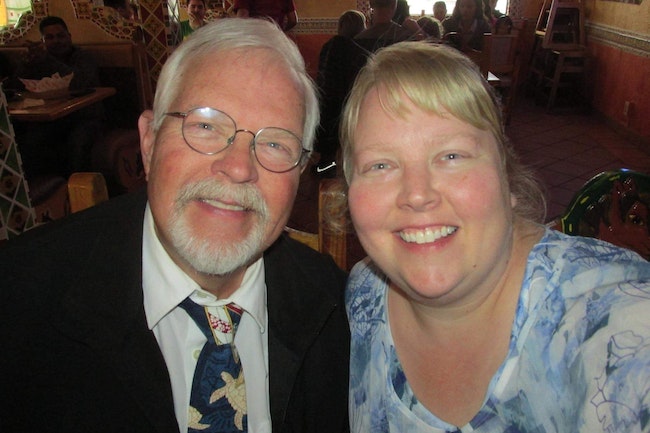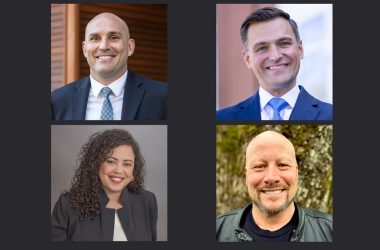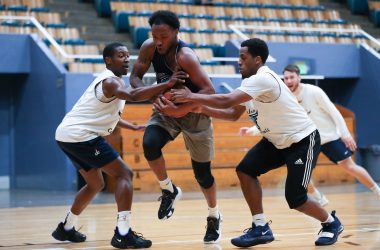 Steve and Jenni Betschart in 2016 (Courtesy/Jenni Betschart)
Steve and Jenni Betschart in 2016 (Courtesy/Jenni Betschart)
Steve Betschart could make friends and strangers cry with a few notes from his bugle.
Betschart, 71, was an accomplished musician, playing trumpet in high school band and later accompanying services at Salem First Church of the Nazarene.
Whether they knew him through church, as a history teacher or from his avocation as a Civil War reenactor, Betschart’s loved ones agree: There was nothing quite like hearing him sound “Taps,” the 24-note bugle call written in 1862.
Betschart died on April 2, 2020, at Salem Hospital – the first Polk County resident to die from COVID-19.
He was one of 10 members of Salem First Church of the Nazarene who fell ill with the virus, rushed to the hospital by ambulance on March 22 after feeling ill for over a week.
For the congregation, his death means an empty chair in the trumpet section at church band rehearsal, an empty seat on the church board and one less friendly face during worship.
“He could flash you the biggest smile and he was so happy to always connect on a Sunday,” said Jerry Morris, the church’s executive pastor.
Betschart’s relatives described him as a man of deep conviction and integrity who worked to resolve conflict and kept his faith at the forefront.
He served in various leadership roles in the Northwest Civil War Council over his more than 30 years as a reenactor, taking steps to make renditions more historically accurate and leading efforts to honor forgotten Civil War soldiers.
Betschart loved to laugh, but wasn’t one for making fun of others or practical jokes. His daughters said he excelled at Dad humor – cringeworthy puns and wisecracks.
When Salem First Nazarene had a worship pastor named Steve, Betschart would greet him with “Hello Steve!” forcing the other Steve to respond in-kind, his daughter, Jenni Betschart said. He was goofy, picking up catchphrases from movies and popular culture.
Daughter Annette Keen said Betschart could never drive past the Dallas cemetery without remarking, “Oh look, there’s the dead center of town!”
Betschart was born in The Dalles in 1948, the youngest of three boys. He came from a family of educators, Keene said. Betschart’s father taught history, and one of his older brothers became a science teacher.
He soon followed in their footsteps, attending Western Oregon University and starting a teaching career at Dallas High School as an intern in 1970. He would stay there until his retirement in 2003.
Betschart married young and had Keen, his first daughter, in 1967. After Betschart divorced, Keen lived with her mother in Monmouth, but she was always welcomed as part of the Betschart family. In 1973, Betschart married Karen Phay, a fellow teacher. They had two children: Jenni and Matthew.
The family always went to church, first in Dallas, then moving to Salem First Nazarene when Jenni was 13.
“His faith was something that he built everyday. He’d get up in the morning, every morning before my mom was awake and read his Bible,” Jenni said.
As a teacher, he lectured without looking at a reference book, easily recalling the dates of battles and historical events.
Mark Stevens, who became Betschart’s friend through Civil War reenacting, said his reputation as a Dallas High School teacher was evident around town. Band geeks, honor students and those who struggled to stay engaged in school all seemed to connect to him.
“I talked to kids who only graduated from high school because Steve emotionally and personally mentored them,” Stevens said.
 Steve Betschart rides his horse, Count, in the Waldo Hills in 2005 (Courtesy/Ken Morris)
Steve Betschart rides his horse, Count, in the Waldo Hills in 2005 (Courtesy/Ken Morris)
Betschart’s love of history, particularly the Civil War era, was apparent.
His daughters said family trips were most often to historical sites. Keen remembered a family trip to Gettysburg in the late 1970s. Betschart himself narrated what happened as they walked through diorama battle scenes.
Betschart joined the Northwest Civil War Council around 1990, serving in the First Oregon Volunteer Infantry and the Twentieth Maine.
Over the years, he played the roles of company bugler, camp chaplain, battalion commander and camp commander for two years.
Ken Morris, a cavalry soldier in the organization, met Betschart as he was learning to ride a horse for his role as a mounted officer.
Betschart’s horse, Count, wasn’t confident and didn’t make for a good beginner horse, Morris said, but Betschart made a good student and was willing to put in the word to learn.
“Here’s a guy who’s a teacher for a living but he’s still open to learning and he recognizes competency when he sees it,” Morris said. “That really increased my respect for him.”
Getting the history right was important to Betschart. He pushed his units to learn new drills and make historically accurate uniforms. As chaplain, he led church services in camp during reenactments, researching hymns to make sure he wasn’t using anything written after 1865.
D.H. Shearer, a longtime friend who met Betschart during their early days reenacting, said his friend’s faith was behind everything he did.
“There was a spiritual component that if you’re going to do something, you need to do it right,” Shearer said.
Stevens said the men often carpooled to Civil War events around the state, spending long hours in the car talking. Betschart was conservative and Stevens is “very not,” he said. But they found common ground in history and deep conversation.
“We talked from the heart. We didn’t hold back. We said what we needed to say,” Stevens said.
“As religious as he was, he never judged me. As secular as I am, I never judged him,” Stevens said.
His children said he was the same way with his family. He loved a good discussion and wanted to understand why people believed the things they did, and he was open to considering new evidence and changing his mind.
“He always gave us space as his children to have our own opinions and he always prayed that we were following God’s will, but he knew that our path was not determined by him,” Jenni said.
Betschart wasn’t afraid to show emotion, whether at camp after a day of battle reenactment or around his children. Jenni recalled her parents driving her up to Tacoma, Washington to start college.
“All the way up to campus my dad and I were crying,” she said. “He was very tenderhearted. He could absolutely be that take charge colonel and he would also be able to later that evening … get on the microphone and recite the Gettysburg Address and get choked up.”
When his second term as camp commander in 2013 ended, Betschart returned to his role as a musician, Morris said. He took joy in the simple act of greeting each morning with Reveille and sounding Taps at night to mark lights out at camp.
Those calls, for many of his friends, will be forever linked with Betschart.
“We lost a huge part of humanity, at least in this corner of the world,” Stevens said. “He’s not famous. But he should’ve been – for being a good guy.”
 Roses laid on Steve Betschart’s coffin during a graveside memorial service on April 9, 2020 in Dallas, Oregon (Courtesy/Jenni Betschart)
Roses laid on Steve Betschart’s coffin during a graveside memorial service on April 9, 2020 in Dallas, Oregon (Courtesy/Jenni Betschart)
SUPPORT SALEM REPORTER’S JOURNALISM – A monthly subscription starts at $5. Go HERE. Or contribute to keep our reporters and photographers on duty. Go HERE. Checks can be sent: Salem Reporter, 2925 River Rd S #280 Salem OR 97302. Your support matters.
Contact reporter Rachel Alexander: [email protected] or 503-575-1241.

Rachel Alexander is Salem Reporter’s managing editor. She joined Salem Reporter when it was founded in 2018 and covers city news, education, nonprofits and a little bit of everything else. She’s been a journalist in Oregon and Washington for a decade. Outside of work, she’s a skater and board member with Salem’s Cherry City Roller Derby and can often be found with her nose buried in a book.









